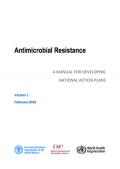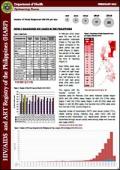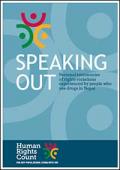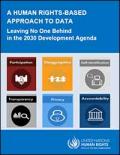What's New
Displaying results 2651 - 2660 of 4914

Resource | Tools,
This manual for developing national action plans to address antimicrobial resistance has been developed at the request of the World Health Assembly to assist countries in the initial phase of developing new, or refining existing national action plans in line with the strategic objectives of the Global Action Plan. It proposes an incremental approach that countries can adapt to the specific needs, circumstances and available resources of each individual country. Details of actions to be taken will vary according to national contexts.

Resource | Publications,
The report recognises that the right to health and freedom from ill treatment are inseparable, which places human rights-based prison monitors, particularly those with a preventative mandate, in a unique and critical position to consider these issues. It notes, however, that this is not yet occurring in an adequately systematic or comprehensive manner, and provides specific recommendations to the European Committee for the Prevention of Torture and Inhuman or Degrading Treatment or Punishment (CPT) and the United Nations Subcommittee on the Prevention of Torture and other Cruel, Inhuman or Degrading Treatment or Punishment (SPT).
Alongside the report, HRI has published a monitoring tool to assist human rights-based prison monitoring mechanisms and other prison monitors to generate better informed, more consistent and sustained monitoring of issues relating to HIV, HCV, TB and harm reduction in prisons, and ultimately to help prevent situations and conditions that can lead to ill treatment in this context from occurring in the first place.

Resource | Fact Sheets,
In February 2016, there were 751 new HIV Ab sero-positive individuals. This was 16% higher compared to the same period last year (646). Eighty-five percent of the cases were asymptomatic at the time of reporting.

Resource | Publications,
Three decades after the first case of HIV was found in Nepal, HIV has become one of the most devastating diseases the country has ever faced. To date it is estimated that 40,000 people are living with HIV and nearly 4,000 have died of HIV-related illnesses in Nepal. Throughout this time, people living with HIV and key affected populations, have experienced and witnessed many violations of their human rights. The project, ‘Human Rights Count for Key Populations Living with HIV (KPLHIV)’, aims to document these violations, to aid advocacy against them and to devise long-term solutions.
In Nepal, the National Association of People Living with HIV/AIDS (NAP+N) consulted with key population networks and decided to focus specifically on people who use drugs and are living with HIV. This report is a result of community-led research carried out by NAP+N and the Drug Users Network in Nepal (DUNA). Together, they gathered testimonies of human rights violations against people from these populations. In total, 34 people were interviewed for this study.

Resource | Presentations,
2016 Conference on Retroviruses and Opportunistic Infections (CROI 2016)
February 22-25, 2016
Boston, Massachusetts, at the Hynes Convention Center

Resource | Presentations,
2016 Conference on Retroviruses and Opportunistic Infections (CROI 2016)
February 22-25, 2016
Boston, Massachusetts, at the Hynes Convention Center

Resource | Presentations,
2016 Conference on Retroviruses and Opportunistic Infections (CROI 2016)
February 22-25, 2016
Boston, Massachusetts, at the Hynes Convention Center

Resource | Publications,
As the preparations for the United Nations General Assembly Special Session (UNGASS) on drugs are well underway, the negotiation process has begun for the official outcome document that will be adopted at the Special Session in April. This outcome document should, according to the UN General Assembly, be a ‘short, substantive, concise and action-oriented document comprising a set of operational recommendations… including an assessment of the achievements as well as ways to address long-standing and emerging challenges in countering the world drug problem’.
This IDPC advocacy note offers some reflections and recommendations on the negotiation process itself, and some general recommendations on the overarching tone that should be reflected in the final document.

Resource | Presentations,
2016 Conference on Retroviruses and Opportunistic Infections (CROI 2016)
February 22-25, 2016
Boston, Massachusetts, at the Hynes Convention Center

Resource | Publications,
In step with the 2030 Agenda for Sustainable Development (2030 Agenda) and its Sustainable Developments Goals (SDGs) adopted by Heads of State and Government at the United Nations Summit in September 2015 (A/RES/70/1), this note aims to provide general guidance and elements of a common understanding on a Human Rights-Based Approach to Data (HRBAD), with a focus on issues of data collection and disaggregation.
As part of the 2030 Agenda, States explicitly reaffirmed their commitment to international law and emphasized that the Agenda is to be implemented in a manner that is consistent with the rights and obligations of States under international law. They called for leaving no one behind and more systematic data disaggregation to help achieve and measure the goals. As devising (or not) disaggregation of indicators is not a norm or value-neutral exercise, and the risks associated with this operation for the protection of the rights of data subjects cannot be denied, an HRBAD has much to offer in this context.





